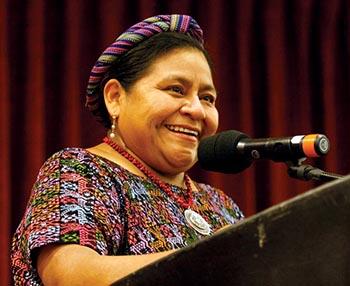FSU Hosts Nobel Laureate Rigoberta Menchú Tum

Activist and Nobel Peace Prize recipient Rigoberta Menchú Tum gave a public talk at 6 p.m. Friday, April 8, at Florida State University as a part of the PeaceJam Southeast Public Talk and Conference, a program coordinated by the FSU Center for Leadership & Social Change.
Born to a poor family of the Quiche branch of the Mayan culture on Jan. 9, 1959, Menchú grew up in Chimel, a village in the northwest mountains of Guatemala. When Menchú was 20 years old, her brother was arrested, tortured and killed by the Guatemalan army, beginning the persecution of her family during the country’s 30 years of dictatorship, war and violence.
The traumatic events of her young adult life led to a lifetime of activism and peaceful resistance that earned her the Nobel Peace Prize in 1992. She was the first indigenous person to receive the honor and one of only a handful of women.
Menchú’s public talk focused on how today’s society is affected by discrimination and hate and how we can work to alleviate suffering and persecution.
The event was free and open to the public and took place:
FRIDAY, APRIL 8 AT 6 P.M.
AUGUSTUS B. TURNBULL III CONFERENCE CENTER
FLORIDA STATE UNIVERSITY
555 W. PENSACOLA ST.
TALLAHASSEE, FLA.
The College of Social Work and the Center for Graduate Students hosted a reception following the talk, and Menchú held a book signing at that time.
ABOUT THE SPEAKER:
In 1954, the CIA supported the overthrow of the Guatemalan government, encouraging an invasion and takeover by the Guatemalan army. An estimated 200,000 Guatemalans were killed in the 30-year war that followed the coup. In particular, the army targeted the indigenous Mayan people, destroying 450 villages and displacing 1 million refugees.
While Menchú and her father, Vicente, organized peaceful resistance, others formed an armed guerrilla movement. The army accused the Menchú family of participating in the guerrilla movement and the execution of a plantation owner and kidnapped, held and tortured Vicente for over a year. Upon his release, he and Menchú formed the Committee of the Peasant Union that worked to secure rights for the Mayan people, including fair wages and land protection.
The Menchú family suffered terribly for their work. In total, Menchú lost her parents, two brothers, a sister-in-law and three nieces and nephews to violence in Guatemala.
Despite this great tragedy, Menchú never stopped fighting non-violently for the rights of the Mayan people. Throughout the early 1980s, she participated in a farm worker strike for better working conditions, large demonstrations at the capital and constantly educated Mayan peasants on ways to resist persecution. She frequently lived in exile during this time.
Menchú became the global voice for the peasants of Guatemala during her exile, drawing international attention to the violence and persecution dealt by the right-wing army. In 1983, a series of interviews was published in a book titled “I, Rigoberta Menchú.”
Four years after winning the Nobel Peace Prize in 1992, a peace accord ended Guatemala’s 36-year civil war and secured many rights for the Mayan people.
Following the end of the war, Menchú took the Guatemalan army to court to be tried for its crimes. In December 2006, the Spanish courts called for the extradition of seven former government members on charges of torture and genocide against the Mayan people of Guatemala.
Menchú ran for president of Guatemala in the 2007 and 2011 elections. Although she did not win, she continued to work for the rights of the Mayan people and all Guatemalans.
